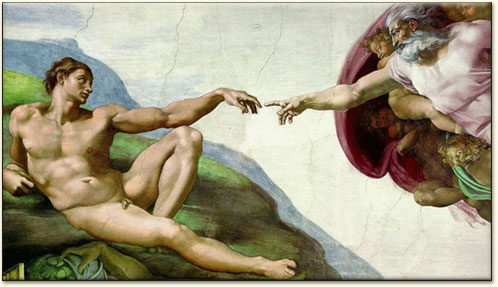"A sparrow does not fall to the ground without God's awareness" (Matthew 10:29).
While Adam Gopnik has us on the subject of Matthew, Darwin, and human significance, let's look at another formulation of meaning and the cosmos.
Panexperientialism: the idea that everything—humans, dogs, mosquitoes, trees, blades of grass, and atoms—has feelings, or an inner life.
According to one of the "most decorated spirituality and ethics writers in North America," Vancouver Sun columnist Douglas Todd:
"There is an intimate correlation between matter, emotion and that elusive quality we now call spirit."
"When it comes to understanding the environment, panexperientialism is also crucial. Humans develop a closer kinship with nature when they recognize that everything on the planet is ultimately made up of things that feel."
"This is not to say humans and a blade of grass are equal. Humans are infinitely more complex, possessing all sorts of emotions, thoughts and aspirations of which a blade of grass, literally, cannot dream."
I wrote him a letter.
* * *
I'm glad I read your column in this morning's Sun: I was dreading sitting down to my Saturday homework, but your argument about panexperientialism so alarmed me that I rushed to the computer with a cup of coffee and here I am now at 9:15 AM. Thank you.
So, divinity is "embedded in the evolutionary process, which works through a combination of chance and purpose"? That sounds like intelligent design to me. By your disclaimer, I was hoping your exploration of panexperientialism was a gesture of charity to those readers who asked for it. But you seem to think it was "the most important part" of your column, too.
The notion seems a last-ditch attempt by religious people to affirm human beings' centrality in the universe. If Christians now concede that a dominion-style relationship with the bears and sparrows, rocks and trees, as laid out in Genesis, leads to environmental rape and spoil, they have two ways to even the balance
- Make everything meaningful
- Make themselves meaningless
Panexperientialism is the former choice: man, assured of his own importance, magnanimously accords it to everything else.
And that would be fine, as far as it went—humans on par with the world of things. But then the ugly notion of primacy creeps back in: "This is not to say humans and a blade of grass are equal."
Do we need the special recognition for humans, Mr. Todd? Are we equal to the world or superior to it?
Here's a crazy idea: We make ourselves peers with the atom, not by making it feel, but by accepting that neither of us matters much.
Insisting on human importance will not, to use your phrase, "urge us towards beauty." Forgetting it will.
Best regards,
John Bucher
P.S. I've attached an excerpt of Adam Gopnik's recent article about Charles Darwin. It applies to this question, I think, and you both reference the same Matthew verse.
* * *
Dear John Bucher,
Thank you for your letter. We'll have to agree to disagree about panexperientialism. If you'd like, you can send your letter to the Letters section of the Sun, but I have no control over whether it gets published.
It's up to you.
Sincerely,
Douglas Todd



No comments:
Post a Comment